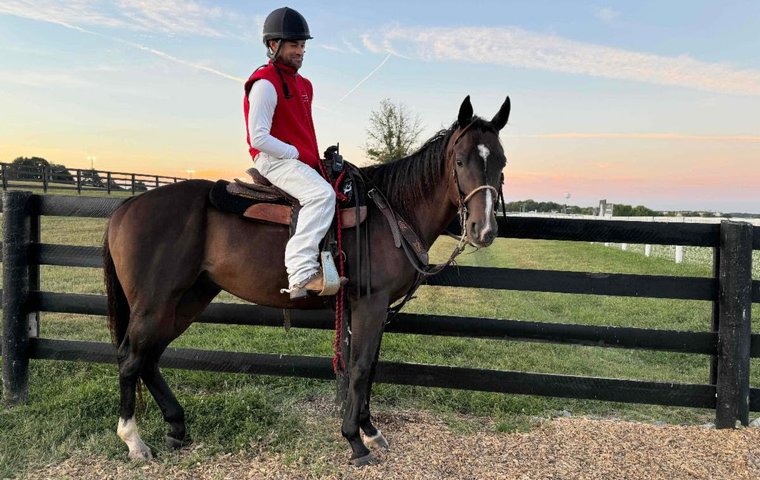
Ten-time winner whose victories included $100,000 event is thriving in second career at Kentucky Downs
Ten-time winner Space Mountain, third in the 2019 Tapit Stakes, is back at Kentucky Downs. Not as a racehorse, having retired two years ago after 56 starts and $441,227 in purse earnings.
Rather, the 11-year-old is outrider Trey Miller’s faithful pony, working double shifts during both morning training (every day) and in the seven afternoons when racing is held.
 Outriders are tracks' mounted police, chasing after and corralling racehorses who get loose or are running off with the rider and making sure exercise riders perform in a safe manner during training. While Miller is the only outrider in the morning for Kentucky Downs’ limited training, he’s one of several during the races.
Outriders are tracks' mounted police, chasing after and corralling racehorses who get loose or are running off with the rider and making sure exercise riders perform in a safe manner during training. While Miller is the only outrider in the morning for Kentucky Downs’ limited training, he’s one of several during the races.
Miller is in his first year as an outrider at Kentucky Downs. He’s also the outrider at the Fair Grounds’ winter meet in New Orleans and for much of the summer worked on the starting gate at Colonia Downs in Virginia. He was an exercise rider before being offered positions as an outrider.
“I got the opportunity to get an outriding job, and of course I needed a couple of horses,” said Miller, who is from Carencro, La., near Lafayette. “My good friend Willie Lavergne had ‘Space’. I ended up getting him. I think Willie bought him off of Steve Asmussen.
“If you don’t have the right horse, you can’t do the job. You’ve got to have a horse that’s level-headed and at the same time ready to go. Just a good, relaxed horse, really. I didn’t mess with him much during his racing career, but he was always a runner.”
Famous stable ponies
Space Mountain is a fine example of retired racehorses thriving on second careers. Two famous racehorses who became stable ponies were 2003 Kentucky Derby and Preakness winner Funny Cide and $5 million-earner Lava Man, who accompanied I’ll Have Another to the post for his 2012 Kentucky Derby victory.
Many retired racehorses, from too slow to be competitive to highly accomplished, have successfully transitioned into show careers.
Space Mountain was bred to be a good horse. He’s a son of Street Cry, who sired 2007 Kentucky Derby winner Street Sense. His dam is the Storm Cat mare Magical Ride, a daughter of G1 winner Victory Ride, who was good enough to have a graded stakes named after her in New York.
Space Mountain’s half-brother by Curlin is Ride On Curlin, second in both the 2014 Preakness and Arkansas Derby.
Space Mountain had four trainers, starting out with Rusty Arnold and finishing second in a Kentucky Downs maiden race in his second start. He ultimately was claimed by Mike Maker, for whom he was third in Kentucky Downs’ Tapit before winning Remington Park’s $100,000 Remington Green.
Space Mountain spent one race in Karl Broberg’s barn before Hall of Famer Steve Asmussen claimed him, training him for his final 12 starts.
Since ‘Space’ has turned out to be such a nice outrider’s pony, does Lavergne, also a Kentucky Downs outrider, want him back?
“He does, but he can’t get him back,” Miller said with a grin.
• Visit the Kentucky Downs website
A life after racing: Travers hero V.E. Day thriving in third career as ambassador at Old Friends
You can call me Alf: meet the sprint star who is still leader of the pack in his life after racing
A life after racing: Woodland Opera – ‘a real showman who just loves attention of any kind’
A life after racing: ‘Thoroughbreds can do anything’ – spotlight on global aftercare efforts
View the latest TRC Global Rankings for horses / jockeys / trainers / sires


